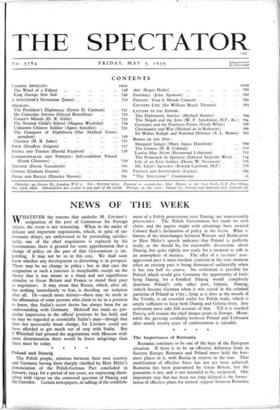NEWS OF THE WEEK
WHATEVER the reasons that underlie M. Litvinov's resignation of the post of Commissar for Foreign Affairs, the event is not reassuring. When in the midst of delicate and important negotiations, which, in spite of un- fortunate delays, are understood to be proceeding satisfac- torily, one of the chief negotiators is replaced by his Government, there is ground for some apprehension that a change of policy on the part of that Government is im- pending. It may not be so in this case. We shall soon know whether any development so disturbing is in prospect. There may be no change in policy ; but in that case the resignation at such a juncture is inexplicable except on the theory that it was meant as a sharp and not superfluous stimulus to Great Britain and France to mend their pace as negotiators. It may mean that Russia, which, after all, has nothing immediately to fear, is deciding on isolation after all. Or—much more sinister—there may be truth in the affirmation of some persons who claim to be in a position to know, that Stalin's secret desire has always been for an understanding with Germany. Molotoff has made no par- ticular impression in the official positions he has held, and he may be regarded as essentially Stalin's man—though that does not necessarily mean change, for Litvinov could not have afforded to get much out of step with Stalin. But if Whitehall had pressed the negotiations with Moscow with more determination there would be fewer misgivings than there must be today.














































